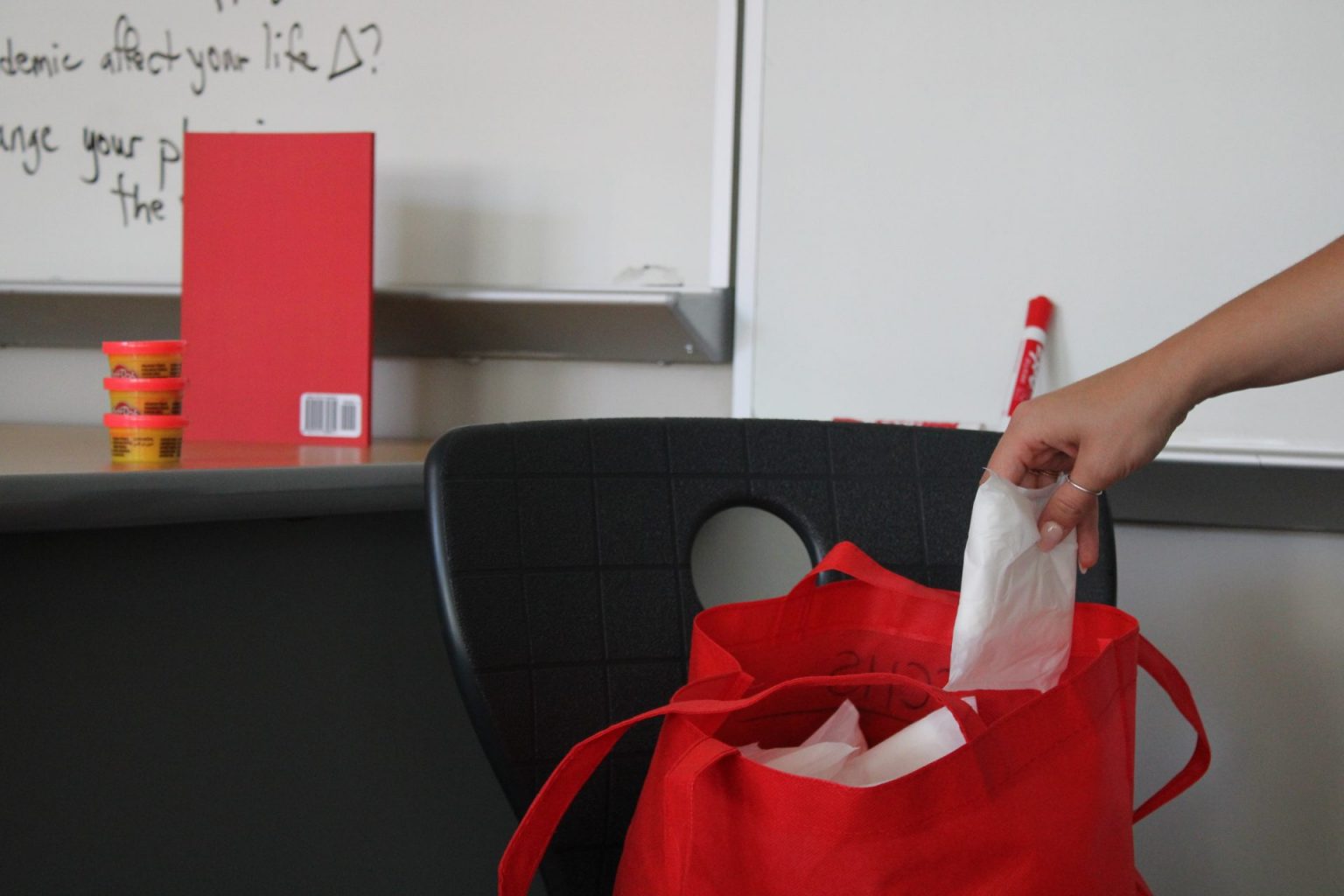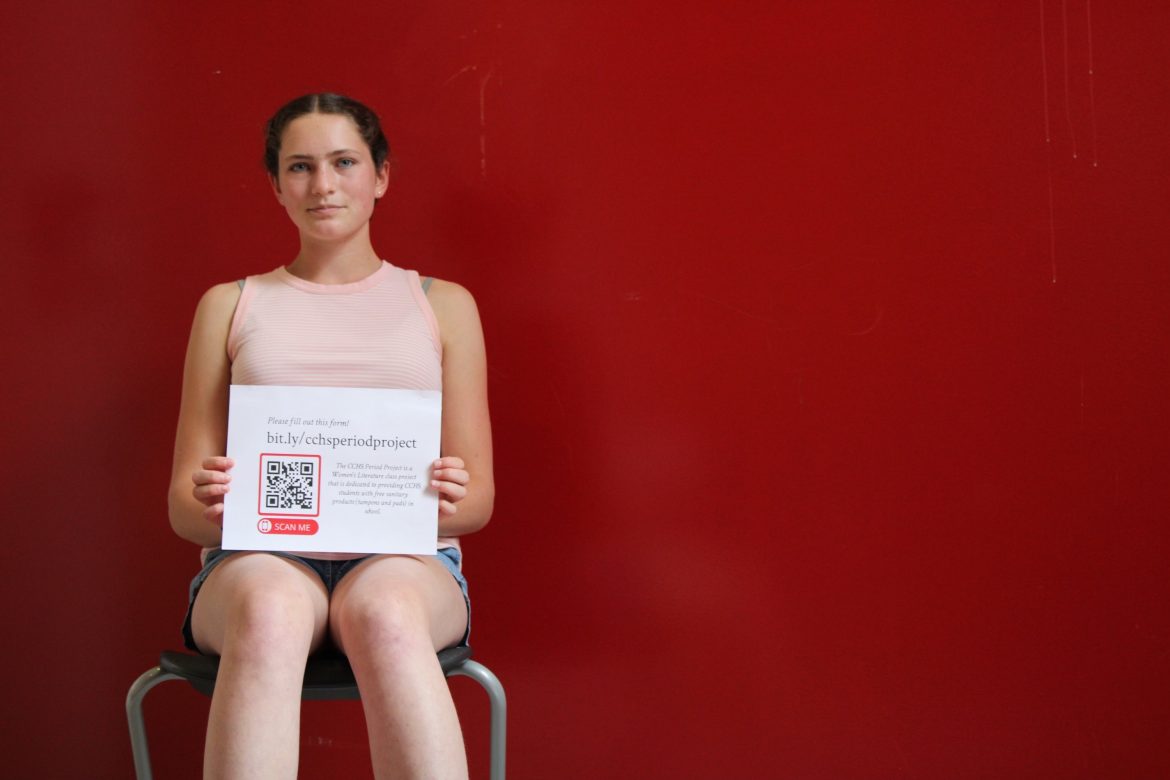Sophomore Natalie Soper, a member of the Period Project, holds up a sign with a QR code for a Google Form on the Freshman Academy Hallway earlier this month. The Period Project, a student-led organization, was created with the goal of not only providing information about menstruation, but also destigmatizing talking about it. “I don’t think that (the stigmatization of periods) is a systemic problem with the school. It’s (just) that (non-menstruators) have never had to think about it. They don’t have to worry (about it). So we’re gonna make them think about it,” CCHS English department teacher Lindsay Coleman-Taylor said. Photo by Lucas Donnelly
Unlike toilet paper and soap, menstruation products are not provided in the women’s restrooms at Clarke Central High School. The Period Project plans on changing that.
The CCHS Period Project is a student-led organization advised by CCHS English department teacher Lindsay Coleman-Taylor. The project began in March and has sparked a conversation among students and teachers throughout the school.
“The plan of the Period Project is to campaign to an outside entity, probably the (Clarke County School District) school board, to try to get free pads and or tampons (to) be available to students in the school because we understand that we have a high poverty rate with our students,” Coleman-Taylor said. “If we’re offering everybody free and reduced lunch because people are below the poverty line, then we should be offering them other life necessities.”
“If we’re offering everybody free and reduced lunch because people are below the poverty line, then we should be offering them other life necessities.”
— Lindsay Coleman-Taylor,
CCHS English department teacher
Coleman-Taylor is not only passionate about the movement itself, but also the fact that it is predominantly student-led.
“I think young adults are not encouraged (enough) to believe in themselves as having the capacity to change the world around them. Especially in a school system, where they’re just presented with problems in history classes and literature classes. We talk about social justice, and we say, ‘Oh my God, look at this problem.’ But then we don’t present a solution, we just present the problem,” Coleman-Taylor said. “What we are meant to do as teachers is shed light on the problems so that the students can grow into people who solve them.”
According to the CCHS student Period Project survey, which was sent out to the CCHS student body and received 458 responses, 78% of polled menstruating students have not had access to or have not been comfortable asking for a menstruation product at CCHS. The survey also found that 37% of the polled menstruating students have been denied the chance to address menstruation issues by a CCHS teacher.

A hand reaches into a bag filled with menstruation products in a Clarke Central High School classroom. CCHS English department teacher Lindsay Coleman-Taylor hopes that the Period Project can help to destigmatize talking about menstruation. “I want my young menstruators in my classes to see power in their processes and to see power in their biology,” Coleman-Taylor said. “I’m tired of the stigma. I’m tired of people saying that it (takes a lack of) manners to talk about these issues because 51% of the population deals with this biological development that actually gives life to other human people. And why are we so scared of it?” Photo by Lucas Donnelly
“We get free laptops. We get free toilet paper. Printer paper? You get that for free. Lunch? There’s just a lot of things that school gives us for free (and) some aren’t necessities, like a computer,” sophomore and Period Project member Lanaia Howell said. “The school funds us with all this kind of necessary stuff, but not the actual necessary stuff, (like period products).”
CCHS nurse Iveta Rabb agrees with the motives of the project but has expressed concern for one of the main goals of the project: implementing menstruation product dispensers in the women’s restrooms.
“I can only see a few downsides to it. That is if we put supply dispensers in the bathroom, who’s going to refill them? And is it going to increase the amount of mess in the bathrooms?” Rabb said. “I agree with the project. I agree with (putting in) effort to make the products more readily available. I simply don’t agree with the dispensers or anything that would increase cost to (the) school.”
A 2018 article by the New York Post had poll statistics showing that out of 1500 women, 630 admitted to experiencing period shaming.
“I think periods and menstruation are just really, really stigmatized. For a long time, it’s just been something that we don’t discuss. You just go to the bathroom and you do your thing,” sophomore and Period Project member Natalie Soper said.
Associated Press News published an article in 2020 about menstruation products, indirectly confirming that “feminine hygiene products” is the official term to be used while writing in AP style, a reputed writing format that many news publications follow. However, that language is becoming increasingly controversial.
“I’d like to say (the term feminine hygiene products is) more shocking than it (actually) is. But I think that’s just another one of those things where it’s just not considered proper, or to be discussed out loud, or apparently even read,” Soper said. “I think that might be part of why (menstruation has been stigmatized) for a really long time. This issue of menstruation products hasn’t come to the forefront because we’re not even saying those words. We’re not even saying menstruation, blood, periods, pads or tampons.”
“But I think that’s just another one of those things where it’s just not considered proper, or to be discussed out loud, or apparently even read.”
— Natalie Soper,
sophomore and Period Project member
Support for providing free menstruation products in CCHS is gaining ground, and members of the Period Project are planning to continue researching the need for menstruation products at CCHS.
“Our research hasn’t gone very far yet. But we’re compiling all the data to go in a packet and we’re hoping to send it out to administrators, the district, whoever is in charge of (what we hope to accomplish),” Howell said. “We’ve been looking into the school budget, and how many menstruators we have at Clarke Central and trying to see how many of them live below the poverty line. I hope that it sparks up a conversation saying, ‘Why isn’t (providing menstruation products) just something that all schools do?’”
